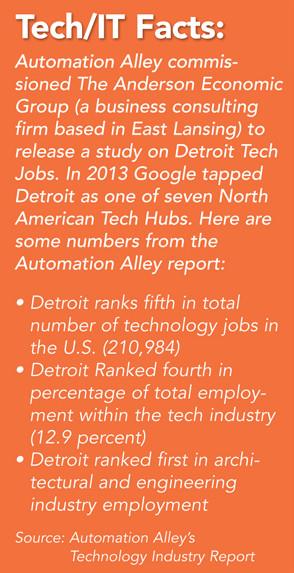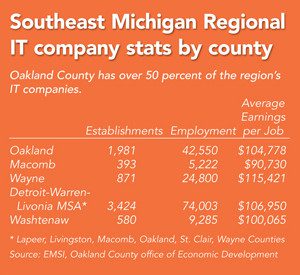

Every day in Michigan, thousands of technology-based jobs are going unfilled, with millions more vacant posts nationwide. These days, high-tech offerings mean the difference between booming and bankruptcy for many businesses. But it takes skilled workers to create, manage and maintain technology needed to keep firms competitive in today’s markets. Workers that are becoming increasingly scarce due to the growing demand coupled with the transient nature of the work. Technology drives business not just here at Quicken Loans but every business. People need to understand this and stay in front of the curve, said Linglong He, chief information officer at Quicken Loans and leader of the Detroit information-technology training program IT in the D. Since 2010, Quicken Loans almost tripled its tech positions, she said. The good news is Michigan is poised to make a stand for the top. The state’s goal? To rival Silicon Valley as a global tech hub. We have been identified as one of the fastest growing states for IT jobs, said Joseph Quick, talent acquisition manager at Michigan Economic Development Corporation (MEDC). But before that happens, Michigan must mobilize a tech-savvy workforce, a task that colleges and universities can’t take on alone, according to He. That’s why an increase in collaborative efforts between the private sector, academic institutions and non-profit organizations along with major investments from the state and the federal government are all bending to restructure traditional training models; ones that keep pace with fleeting technologies. For business leaders, this means becoming more active in the training process and investing more in future workers. Companies need to work proactively to find the right talent for an individual company, He said. Because of Quicken Loan’s Technology University an in-house training camp for new hires how fast an applicant is able to learn can trump what they already know. We’re looking for people with the right aptitude to come to the door, she said.  For employers, there are optimal traits to screen for in the application process that show whether a candidate is a good fit beyond the learned skills. The ability to adapt quickly and solve problems is key, said Jacqui Mieksztyn, manager of talent programs at the MEDC. The state of Michigan expanded its technical training efforts this fall with a new pilot program based on a German education model where educators and employers are equally invested and trainees are paid to learn. The Michigan Advanced Technician Training (MAT2) program launched in September with 30 trainees, all high school grads and college students interested in a career in mechatronics or technology combining electronics and mechanical engineering. Once accepted or âhired’ into the MAT2 program, students begin a three-year paid training program with a guaranteed job upon completion with one of 11 participating companies. The vocational, hands-on approach of integrating trainees into the workplace is something that more training programs are embracing to keep up with the times. And government funding has been made available to enhance that. For instance, Automation Alley, a technology business association dedicated to growing Southeast Michigan’s economy through workforce and business development initiatives, received $5 million from the U.S. Department of Labor for the Technical Talent Development Program which funds local employer involvement in high-level IT training of both potential and current workers. Making mentors Even inside workforce challenges around technology there is opportunity. One Detroit-based tech venture is banking on the idea that there’s money in the training business, especially with the demand for high skill IT workers on the rise. And it’s not another corporate training company cranking out certifications. We’ve got to do something different and innovative and change to meet demand, said Bradley Hoos, who co-founded Grand Circus with his business partner Damien Rocchi with the backing of venture capital firm Detroit Venture Partners. Grand Circus is a for-profit IT training company that has been described as a modern training tech academy. The company lives on the cutting edge of technology with real-world work environments instead one that is classroom based. The company focuses on skills that are most in demand: digital marketing, Web design, iPhone developers. And the market is there: Since its inception in February 2013, the firm has trained 1,000 people. Hoos says what sets Grand Circus apart from traditional classes is its holistic approach. They say it takes a village to raise a child, but it takes a community to develop tech personnel, Hoos said. We moved away from just learning (tech) skills, not that that is not important, but all student participants have mentors in the Detroit community.
For employers, there are optimal traits to screen for in the application process that show whether a candidate is a good fit beyond the learned skills. The ability to adapt quickly and solve problems is key, said Jacqui Mieksztyn, manager of talent programs at the MEDC. The state of Michigan expanded its technical training efforts this fall with a new pilot program based on a German education model where educators and employers are equally invested and trainees are paid to learn. The Michigan Advanced Technician Training (MAT2) program launched in September with 30 trainees, all high school grads and college students interested in a career in mechatronics or technology combining electronics and mechanical engineering. Once accepted or âhired’ into the MAT2 program, students begin a three-year paid training program with a guaranteed job upon completion with one of 11 participating companies. The vocational, hands-on approach of integrating trainees into the workplace is something that more training programs are embracing to keep up with the times. And government funding has been made available to enhance that. For instance, Automation Alley, a technology business association dedicated to growing Southeast Michigan’s economy through workforce and business development initiatives, received $5 million from the U.S. Department of Labor for the Technical Talent Development Program which funds local employer involvement in high-level IT training of both potential and current workers. Making mentors Even inside workforce challenges around technology there is opportunity. One Detroit-based tech venture is banking on the idea that there’s money in the training business, especially with the demand for high skill IT workers on the rise. And it’s not another corporate training company cranking out certifications. We’ve got to do something different and innovative and change to meet demand, said Bradley Hoos, who co-founded Grand Circus with his business partner Damien Rocchi with the backing of venture capital firm Detroit Venture Partners. Grand Circus is a for-profit IT training company that has been described as a modern training tech academy. The company lives on the cutting edge of technology with real-world work environments instead one that is classroom based. The company focuses on skills that are most in demand: digital marketing, Web design, iPhone developers. And the market is there: Since its inception in February 2013, the firm has trained 1,000 people. Hoos says what sets Grand Circus apart from traditional classes is its holistic approach. They say it takes a village to raise a child, but it takes a community to develop tech personnel, Hoos said. We moved away from just learning (tech) skills, not that that is not important, but all student participants have mentors in the Detroit community.

The mentorship aspect allows students to connect directly with employers and jobs, as well as a chance to synergize with Detroit’s community of IT professionals. No one else is really doing it and that’s where we swim into the picture, Rocchi said. He said technology boosts almost any skill set to make a candidate more marketable. Rocchi recalls a graphic design student who had four job offers after he took a ten-week front end Web development class at Grand Circus. We have great design talent in the city but when you add something like coding or some developing skill it opens a world of opportunity, Rocchi said. There is a common approach among new training models of treating technology more like a trade than a theoretical pursuit. The thing that’s setting MAT2 apart is that hands-on component in a real setting versus in a classroom, Mieksztyn said. This is a competency-based program… at the end of this they are going to demonstrate that they didn’t just pass a test. The culture of test passing in technology, especially in IT, is something that is weighed too heavily if you ask Rocchi and Hoos. They see IT certifications as more symbolic than necessary. When asked how important certifications are for IT specialists, Hoos responds with a question. How important is wearing a wedding ring to having as successful marriage? Even with increased training efforts, no one is certain if the skill gap will ever close between technical jobs and workers for them. In a field like IT, for example, workers can fall out of practice in a matter of weeks without an environment and a mindset wired for constant learning. With the technology of today it’s important that people have an open mind. It changes every single day. You find people willing to learn quickly, willing to change, work with others and take ownership, he said.  One graduate of IT in the D says it was his experience in the program and not the classroom that got him ready for the workplace. Ian Kwiotek joined IT in the D in 2011 from Wayne State University and was hired directly into Quicken Loans after completing the program. It was really cool because it bridged the gaps between school and business, Kwiotek said. In business, they focus on so many different channels. You may spend four years in school focusing on one thing, but when you get that first job it could be completely different. Beyond Technology With demand for workers as high as it is, almost anyone with the right skills can find a job in technology, but they may not last long if they don’t have the right soft skills the ability to work with others, communicate and network with other people in their field, according to He. That’s an aspect of technology work that is often overlooked when talking about the field. A lot of people in tech are introverted, but being able to work with group sets you above the curve, Kwiotek said. For me, (working with groups) was scary at first but it was exciting. The issue is in school they don’t focus on those soft skills. As schools work to enhance their grasp of tech training techniques, business leaders are learning their involvement can play a key role shaping the workforce and the economy, experts say. Oakland County recently started an IT focus group, inviting technology related businesses to come together and brainstorm ideas on how to get better, especially when it comes to home-grown talent. They’re working on some really exciting things, said Irene Spanos, director of economic development and community affairs at Oakland County. We asked them if (we should) add bringing in talent into the long-term plan. Every one of them said no.
One graduate of IT in the D says it was his experience in the program and not the classroom that got him ready for the workplace. Ian Kwiotek joined IT in the D in 2011 from Wayne State University and was hired directly into Quicken Loans after completing the program. It was really cool because it bridged the gaps between school and business, Kwiotek said. In business, they focus on so many different channels. You may spend four years in school focusing on one thing, but when you get that first job it could be completely different. Beyond Technology With demand for workers as high as it is, almost anyone with the right skills can find a job in technology, but they may not last long if they don’t have the right soft skills the ability to work with others, communicate and network with other people in their field, according to He. That’s an aspect of technology work that is often overlooked when talking about the field. A lot of people in tech are introverted, but being able to work with group sets you above the curve, Kwiotek said. For me, (working with groups) was scary at first but it was exciting. The issue is in school they don’t focus on those soft skills. As schools work to enhance their grasp of tech training techniques, business leaders are learning their involvement can play a key role shaping the workforce and the economy, experts say. Oakland County recently started an IT focus group, inviting technology related businesses to come together and brainstorm ideas on how to get better, especially when it comes to home-grown talent. They’re working on some really exciting things, said Irene Spanos, director of economic development and community affairs at Oakland County. We asked them if (we should) add bringing in talent into the long-term plan. Every one of them said no.







